Nigerian News Websites Continue To Face Massive Cyber Attacks For Holding Authorities Accountable
Aside from failure to protect journalists and platforms doing investigative reporting, authorities are increasingly trying to silence the media.
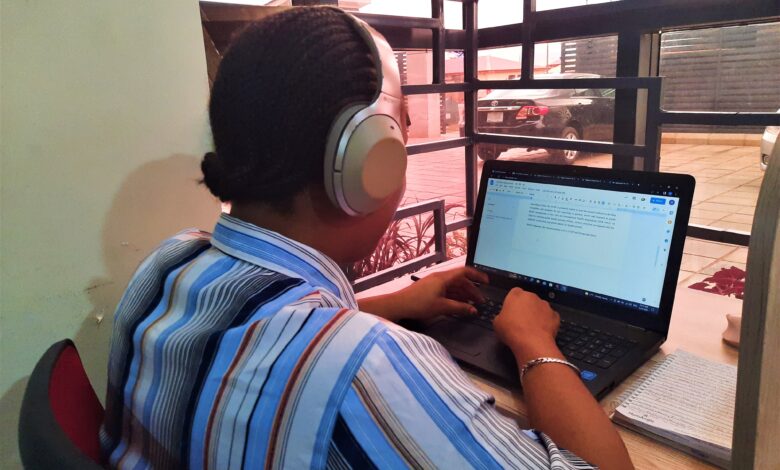
Hours after HumAngle published a report that forensic analysis showed that videos showing the killing of protesters at the Lekki toll-gate area by soldiers on Oct. 20, 2020 was authentic, the medium experienced a massive cyber attack.
The military action was as a result of #EndSARS protest against the extra-judicial killings and other irregularities by operatives of the now disbanded police’s Special Anti-Robbery Squad (SARS) in Oct. 2020.
While the Nigerian Army and Defence Headquarters classified the reports and videos from the scene of the incident as fake and ‘doctored’, HumAngle on Oct. 24, 2020, reported that Digital Forensic Research (DRF) Lab noted that open-source evidence contradicted these denials.
“Our first experience with those who attacked our website was recorded days after the #EndSARS protest shooting in 2020. We realised that our website could not be reached hours after we published a report that contradicted the claim of the military. We encountered an attack known as DDoS attacks. It made our website inaccessible for our audience and we suspected that it was because of our report,” HumAngle’s IT lead, Muhammad Jibrin said.
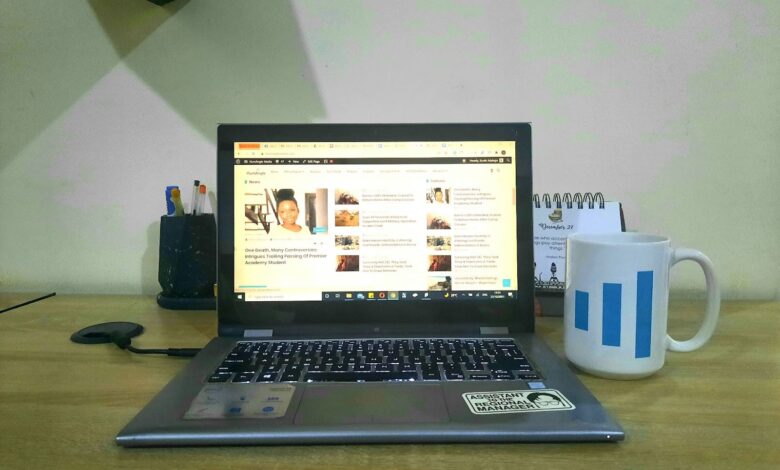
DDoS (distributed denial-of-service) attack is a malicious attempt to disrupt the normal traffic of a targeted server, service or network by overwhelming the target or its surrounding infrastructure with a flood of internet traffic.
From a high level, a DDoS attack is like an unexpected traffic jam clogging up the highway, preventing regular traffic from arriving at its destination. When a victim’s server or network is targeted, the server or network becomes overwhelmed, resulting in a denial-of-service to normal traffic.
Online journalism attacks
The popularity of online journalism in Nigeria can be attributed to the rise in internet access. Since the deregulation of the telecommunications sector in 2001, internet access in Nigeria has grown exponentially.
It is a contemporary form of journalism where editorial content is distributed via the internet as opposed to being published via print or being broadcast on radio or television.
Like HumAngle, many other newsrooms practising accountability journalism have had their share of DDoS attacks. Premium Times Newspaper’s IT lead, Richard Akinwumi told our reporter that the platform has survived at least two massive cyber attacks. The first was before the 2015 general elections and the second in 2020.
“There is no way accountability media would not be attacked. Premium Times has survived at least two attacks because of the kind of journalism we do. These attacks have only made us invest more on our website’s infrastructure security. The hackers embark on DDoS attacks when they cannot totally take control of your site,” Akinwumi told HumAngle.
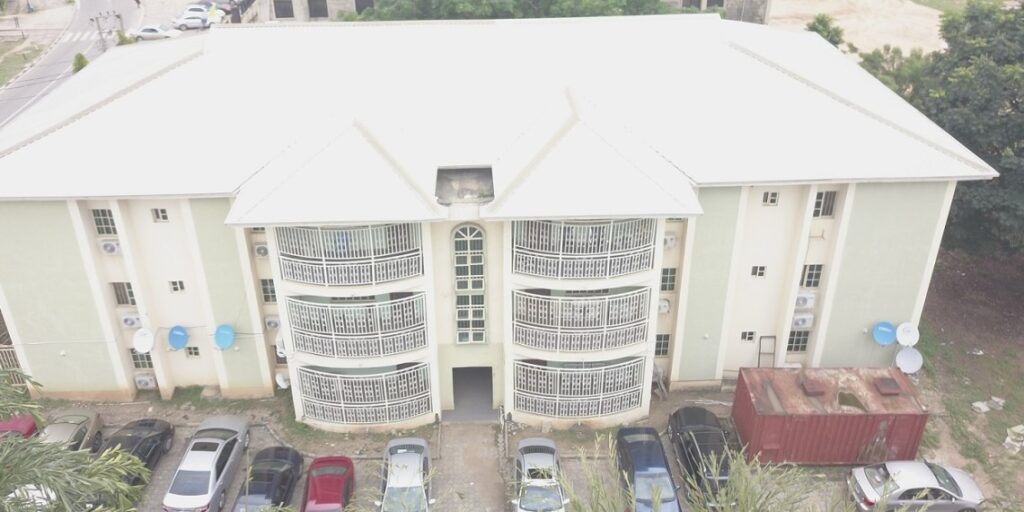
“It doesn’t stop there because they go as far as hacking your social media accounts, creating fake social media pages, and reporting your website on flimsy excuses. When these things happen, we feel we just need to do more in holding power accountable and ensure that our readers are not misled. All these make keeping the website alive technically demanding and expensive.”
‘Gov’t orders clampdown of news website’
In January 2021, another online newspaper, Peoples Gazette, said a vast majority of its web readers were denied access to its content owing to a disruption allegedly influenced by the government. The platform, launched in 2020, has been critical of the government’s actions and policies, including its coverage of the #EndSARS protest staged in October and the aftermath of the protest.
The managing editor of the newsroom, Samuel Ogundipe alleged that the disruption was based on a directive from the Nigerian government to MTN, Glo Mobile, and other telecom firms.
“We have strong grounds to believe that the restriction was deliberate based on the preliminary conclusion of webmasters,” Ogundipe said.
MTN later confirmed blocking its subscribers from accessing Peoples Gazette’s network based on written directives from the Nigerian Communication Commission (NCC). This was also confirmed by another telecom firm, 9mobile, in a separate letter responding to Peoples Gazette lawyer’s demand to lift the restrictions.
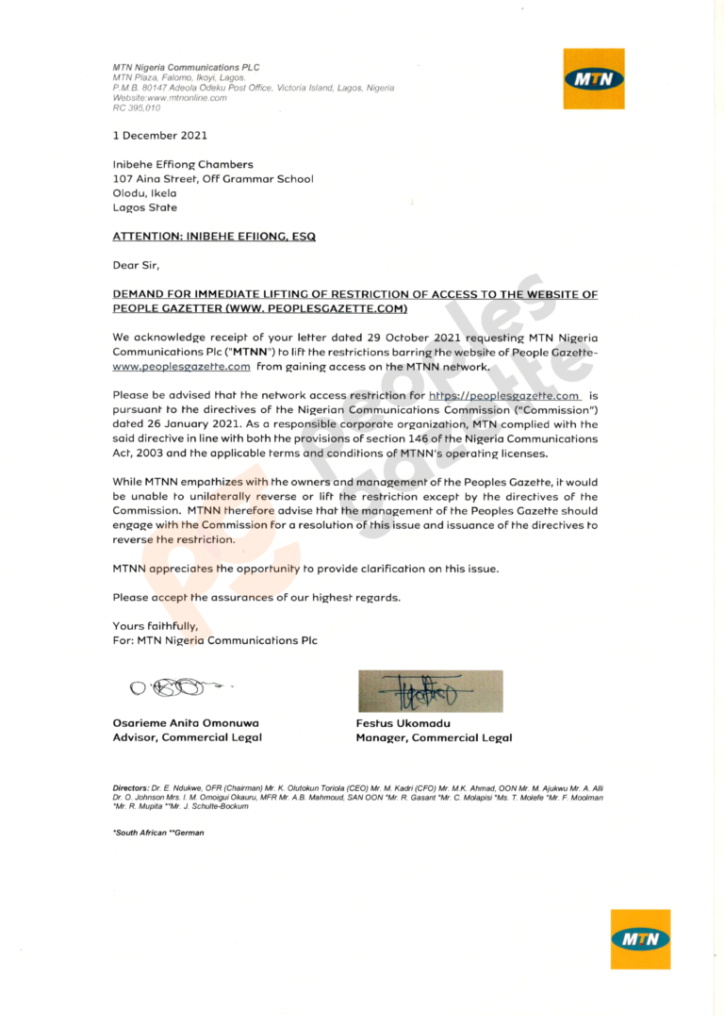
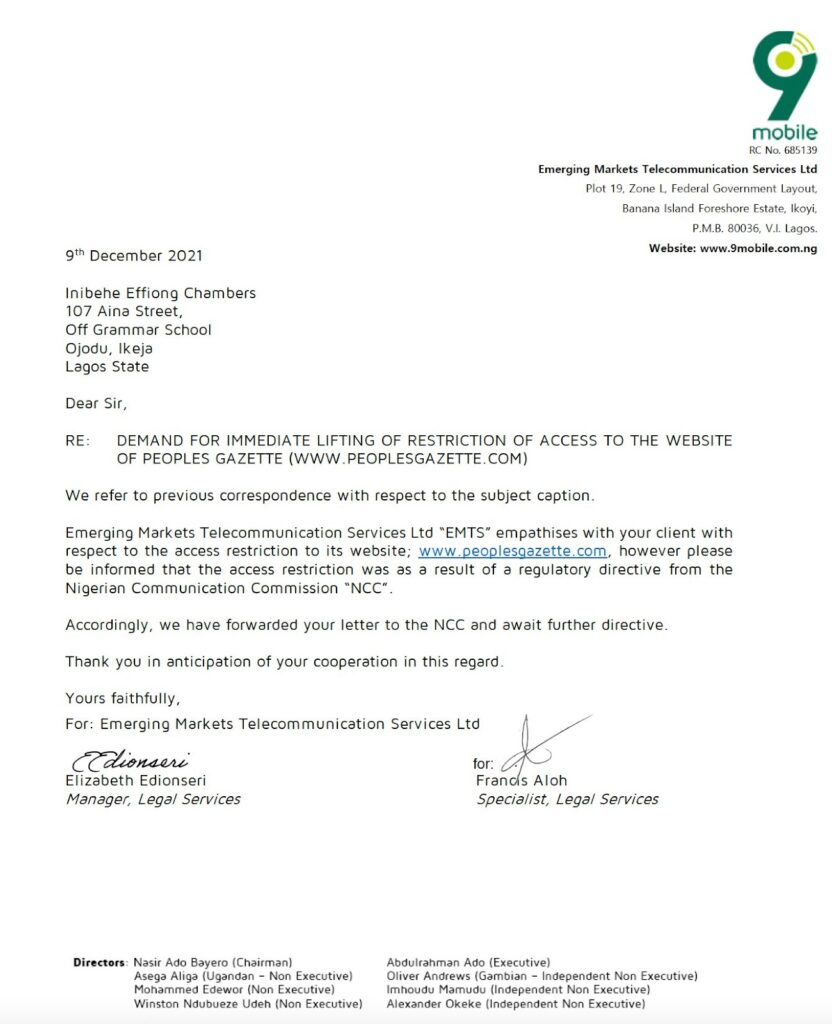
In reaction to this, Angela Quintal, CPJ’s Africa program coordinator noted that Journalists in Nigeria are too often faced with deliberate obstructions to their work and intimidation tactics by politicians. “Authorities in Nigeria should ensure media outfits are able to have their work unhindered by online disruptions or fear of retaliation.”
Authorities actions and inactions
Nigeria is one of West Africa’s most dangerous and difficult countries for journalists, who are often spied on, attacked, arbitrarily arrested, or even killed. The security forces and government officials are behind the vast majority of these incidents.
The government at the federal and state levels have also contributed to the gag against the press, thereby violating the nation’s 1999 Constitution, which advocates press freedom.
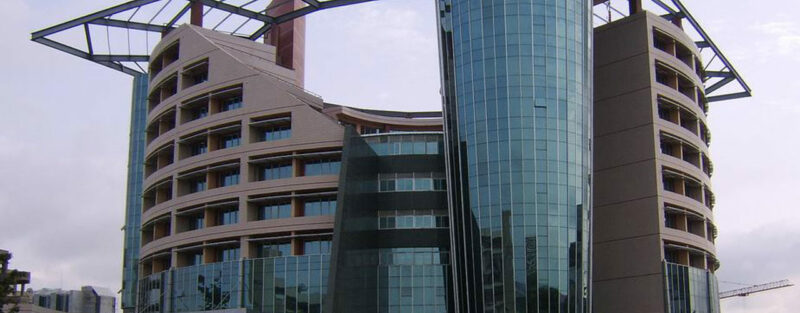
Section 22 of the Constitution says “The press, radio, television and other agencies of the mass media shall at all times be free to uphold the fundamental objectives contained in this Chapter and uphold the responsibility and accountability of the Government to the people.”
The Constitution also states in Section 34 that “Every person shall be entitled to freedom of expression, including freedom to hold opinions and to receive and impart ideas and information without interference.” It added that every person shall be entitled to own, establish and operate any medium for the dissemination of information, ideas and opinions.
The frequent attacks and shutdown of networks of media outlets contributes to Nigeria ranking 120 out of 180 on the World Press Freedom Index. The Nigerian government also introduced the Cybercrime Act which has many provisions that violate the Constitutional provision of the right to freedom of expression.
Since the controversial Act was signed into law in 2015, many media outlets and journalists have witnessed massive cyber attacks from authorities for doing critical reports. There are various journalists who have been jailed for distributing information to the public due to the provision of the Act.
Section 24 of the Cybercrime (Prevention & Prohibition) Act 2015 prescribed punishment ranging from a fine of not less than N2 million or imprisonment for a term of not less than one year or to both fine and imprisonment, up to a term of not less than ten years or a fine of not less than ₦25 million or both fine and imprisonment; depending on the severity of the offence.
The Socio-Economic Rights and Accountability Project (SERAP), one of the frontline Civil Society Organisations (CSO) in Nigeria later filed a suit before the ECOWAS Court of Justice, challenging the legality and compatibility of Section 24 of the Cybercrime Act.
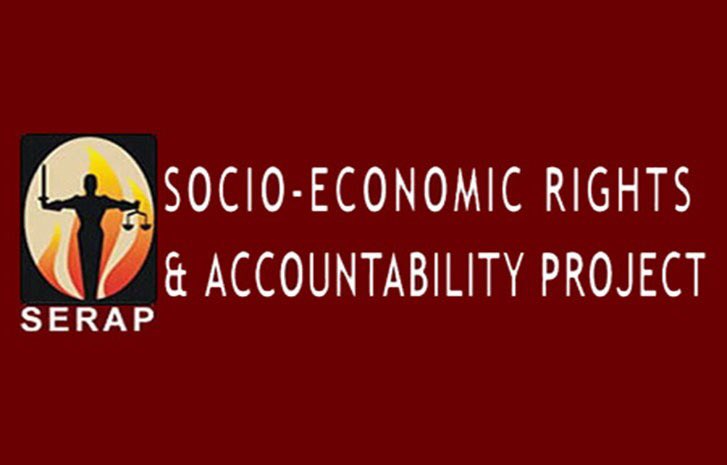
It particularly alleged that the Section violated the rights to freedom of expression, information and other rights of human rights defenders, activists, bloggers, journalists, broadcasters, and social media users through repressive use and interpretation by agents of the respondent, the same being vaguely worded and ambiguous.
SERAP contended that since the passage of the Act, the Nigerian government and its agents had used its provisions to harass, intimidate, arbitrarily arrest, detain, and unfairly prosecute users of the social media, human rights defenders, activists, journalists, broadcasters, and bloggers who express their views perceived to be critical of the Government both at the Federal and State levels.
ECOWAS Court, however, ruled on March 28 that the section of Nigeria’s cybercrime law is not in conformity with Articles 9 of the African Charter on Human and Peoples’ Rights (ACHPR) and the International Covenant on Civil and Political Rights (ICCPR), hence, it should be amended.
Nigerians also banded together online to call for the scrapping of Protection from Internet Falsehood and Manipulation Bill 2019, otherwise known as Social Media Bill which, they say, threatens to roll back internet freedom in the country. The proposed legislation would allow Nigeria‘s government to cut off internet access or block specific social media platforms such as WhatsApp, Facebook, and Twitter at its own discretion.
The gag against the press was more prominent in 2021 after the government banned Twitter following the deletion of a tweet by President Muhammadu Buhari.
The National Broadcasting Commission (NBC), Nigeria’s broadcast regulator, issued an official statement directing local broadcasters to cease using Twitter for newsgathering and reporting or as material for phone-in commentary. Citing national security concerns, the statement warned that broadcast organisations that continue to use Twitter will be deemed as “unpatriotic.”
Call for protection
During the International Day to End Impunity for Crimes against Journalists in Nov. 2021, media experts urged the Federal Government and security agencies in the country to end attacks on media houses and journalists.
The Media Rights Agenda (MRA) Director, Edetaen Ojo, said instead of “gagging the press”, the government should establish a specialised team of prosecutors to facilitate the effective investigation and prosecution of perpetrators of crimes against journalists and other media workers for Nigeria to fulfil its regional and international treaty obligations to ensure the safety of journalists.
A media expert, Kene Obiezu, said Nigeria must guarantee safety of journalists as they give people a voice, and enable them to ask authorities tough questions. The Executive Director of the International Press Centre (IPC), Lanre Agorundade said CSOs and non-state actors, including the various professional groups, trade unions, academics, etc., are critical voices that should be heard on the issue of safety of journalists.
On his part, the publisher of Premium Times, Dapo Olorunyomi, argued that “journalists cannot afford to relent in the advocacy for complete freedom of the press as the press continues to be important for ensuring transparency and accountability in governance.”
Support Our Journalism
There are millions of ordinary people affected by conflict in Africa whose stories are missing in the mainstream media. HumAngle is determined to tell those challenging and under-reported stories, hoping that the people impacted by these conflicts will find the safety and security they deserve.
To ensure that we continue to provide public service coverage, we have a small favour to ask you. We want you to be part of our journalistic endeavour by contributing a token to us.
Your donation will further promote a robust, free, and independent media.
Donate HereStay Closer To The Stories That Matter




